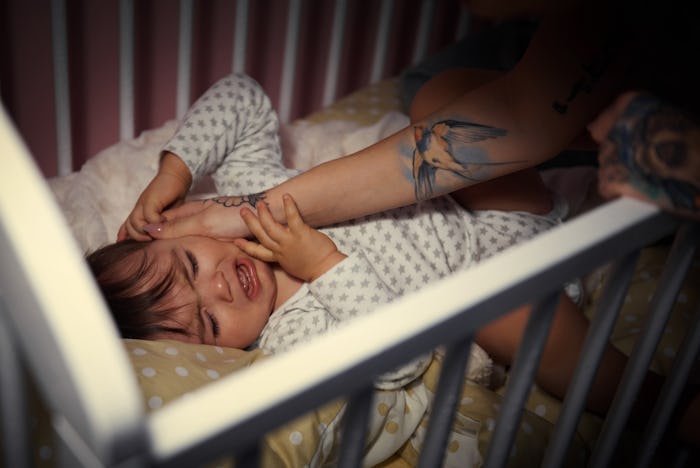Life

Night Light Or Pitch Black To Help Baby Sleep? The Experts Have Some Answers
There's so much to figure out when preparing the baby’s room. There are themes, colors, figuring out where furniture is going to go. Then there's the lighting. Do babies sleep better in complete darkness? When planning furniture placement, I remember being nervous about going into my son’s room at 3 a.m. in the pitch blackness trying to find him in his crib to change his diaper and feed him while knocking into everything in his room. Plus, we all need a light for when we ninja crawl and roll out of their bedroom once we finally get them asleep and put them down, right?
While it does depend on the baby of course, Dr. Jay Lovenheim, D.O., of Lovenheim Pediatrics in West Orange, New Jersey, tells Romper that at first, until about 4 months, complete darkness may be the way to go to make sure your baby sleeps well. "The darkness helps to train a baby to understand the difference between daytime and night time and helps to eliminate anything that may stimulate your newborn and keep them up,” he says. “However, after a few months, your baby may prefer some light so that they can reassure themselves that they are in familiar surroundings.”
Babies do enjoy complete darkness at first and don’t seem to be afraid of it because it’s basically what they have been living in for the last nine months. Dr. Gina Posner, M.D., a board certified pediatrician at MemorialCare Orange Coast Medical Center in Fountain Valley, California, tells Romper that babies tend to sleep better in the dark because they became acclimated to it when in the womb. “Some do well with night lights, while others may be affected by them," Posner says. "Sleep is incredibly important for a newborn’s cognitive and physical development, so as parents we need to find out what works best for our small bundles of joy.”
For some babies, a night light helps them feel comfortable that they are in familiar surroundings if they happen to wake up in the middle of the night. (Ha, “happen to.")
“A nightlight is a great way to provide this stability and is unlikely to negatively affect your baby sleeping," Lovenheim says. "The type of light that you provide will likely not make a difference.”
In fact, a night light could be beneficial to some babies. “There is no absolute rule or individual preference for darkness or dim light in an infant’s or young child’s room," says Dr. Daniel Lewin, Ph.D, associate director of sleep medicine at Children’s National Hospital. "Babies are often up in the middle of the night — sometimes babbling, playing with fingers and toes or other items in their crib — and low-level lighting has no known negative effects, and may facilitate quiet and developmentally appropriate middle-of-the night activities," he explains, adding that, for older children, a dim light may help to decrease fearfulness, and for others minimal visual stimulation may facilitate sleep.
A night light that's dim and doesn’t change colors might be best to ensure your baby gets a good night’s sleep. “A constant glow from a music machine or a non-led light bulb should not cause any harm. However, it is preferred to keep lights that are constantly changing colors, frequency, or intensity (such as a tv) off while your child sleeps,” Lovenheim says. “The constant changing of the light may act to keep your child more awake than asleep.” Posner says a dim light should be OK, but bright lights might disturb sleep for many babies. "However, I think you have to see how your particular child does with these different types of light because every child will respond differently," says Posner.
Lewin says blue spectrum light does have more of an impact on the circadian system than warm or amber spectrum lights. When children are exposed to light, particularly the blue light often emitted by electronics, it has an impact on sleep as well as many other physical and mental activities. "Blue spectrum and bright light in the evening can delay or blunt the primary circadian input that helps us fall asleep, but bright and blue light in the morning can help to positively regulate the 24 hour sleep-wake cycle," says Lewin. "So the current best recommendations are to decrease blue spectrum and bright lights in the evening about an hour or hour and a half before bedtime, coinciding with the setting of the sun, and increasing bright light in the morning hours."
Experts:
Dr. Jay Lovenheim of Lovenheim Pediatrics in West Orange, New Jersey.
Dr. Gina Posner, a board certified pediatrician at MemorialCare Orange Coast Medical Center in Fountain Valley, California.
Dr. Daniel Lewin, associate director of sleep medicine at Children’s National Hospital in Washington, D.C.